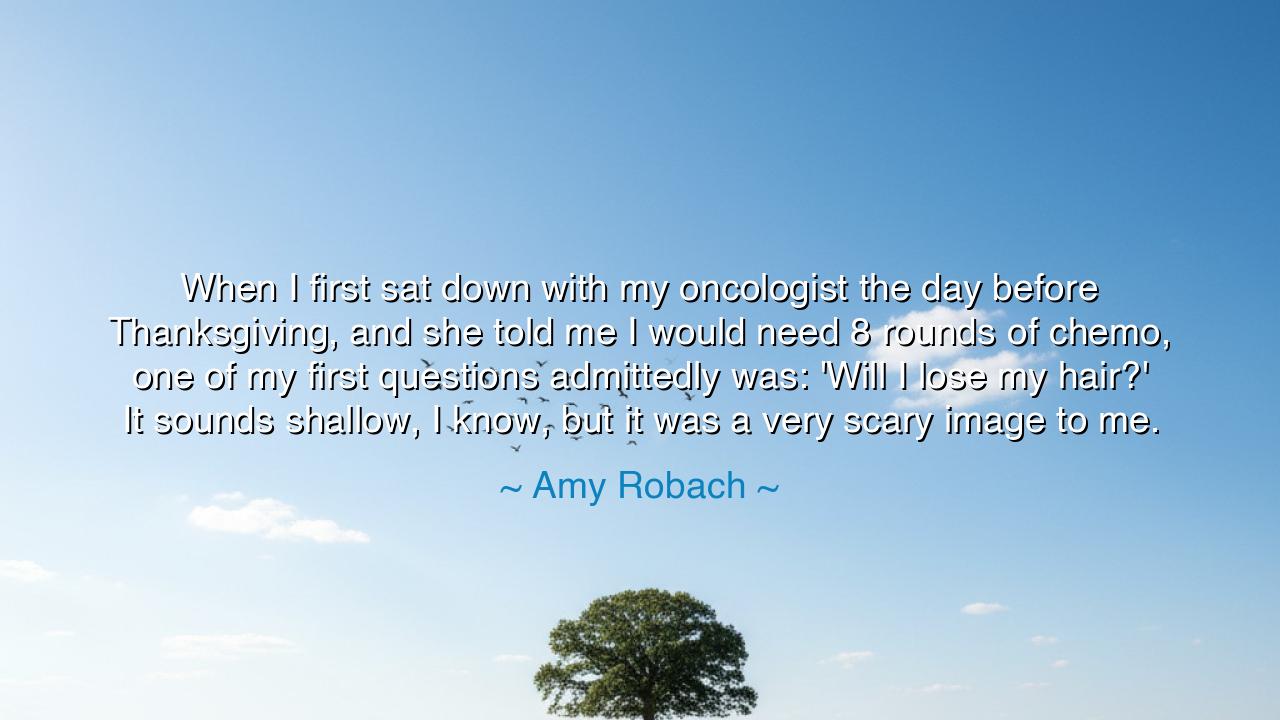
When I first sat down with my oncologist the day before
When I first sat down with my oncologist the day before Thanksgiving, and she told me I would need 8 rounds of chemo, one of my first questions admittedly was: 'Will I lose my hair?' It sounds shallow, I know, but it was a very scary image to me.






Amy Robach, a journalist of strength and candor, once revealed: “When I first sat down with my oncologist the day before Thanksgiving, and she told me I would need 8 rounds of chemo, one of my first questions admittedly was: 'Will I lose my hair?' It sounds shallow, I know, but it was a very scary image to me.” In this confession, she opens a window into the human heart, showing us how the trials of illness do not only shake the body, but pierce the spirit. Her words remind us that in the face of great suffering, it is often the visible symbols of loss—like the loss of hair—that strike us first, for they make the hidden battle within suddenly undeniable to the world outside.
The origin of this moment lies in her diagnosis of cancer, a word that has long carried both fear and stigma. To sit before an oncologist is to be confronted with mortality, to hear the verdict of suffering written across one’s near future. And yet, Robach’s first instinct was not to ask about survival rates, but about her hair. This may seem trivial, yet it reflects a universal truth: the human spirit longs not only for life, but for dignity, identity, and the ability to recognize itself in the mirror. For in the strands of hair lie associations with beauty, vitality, and selfhood—things that sickness threatens to strip away.
History itself records similar responses to suffering. When soldiers of World War I returned from the trenches, many were haunted not only by the injuries they endured, but by the disfigurements that altered their faces. Governments even commissioned special masks for the wounded, so they might reclaim some semblance of humanity in the eyes of others. Just as these men longed for their old faces, Robach longed for the familiar image of her own reflection. Such is the truth of suffering: we fear not only the pain itself, but the loss of who we are in the eyes of the world.
There is a deeper heroism in Robach’s words. To admit fear is itself an act of courage. Many cloak their vulnerability, presenting only stoicism to the world. But she shows that true strength is not the absence of fear, but the willingness to walk forward while acknowledging it. In asking her question about hair, she revealed the profound human need for reassurance—that even in battle, we crave to carry a piece of our identity intact. Vulnerability, when voiced, becomes the seed of courage.
The timing of her story—the day before Thanksgiving—adds an even more poignant layer. While families across the nation prepared for feasts of gratitude, she sat in a doctor’s office facing the prospect of suffering and loss. Yet in later reflections, Robach often spoke of finding deeper thanksgiving in her journey: thanksgiving for life, for resilience, for the chance to fight. Thus, her trial became a redefinition of gratitude—not for ease, but for endurance.
The lesson for future generations is this: do not despise the fears that seem small in great struggles. To fear the loss of hair in the face of cancer is not shallow, but deeply human. These outward things are bound to our inward souls, and it is natural to grieve their loss. But remember also that the strength of the human spirit lies in adaptation. Beauty may be altered, but identity remains. Dignity may be threatened, but courage restores it.
Practical wisdom flows from this: when walking with others in suffering, do not dismiss their small fears. Honor them, for they are part of the greater battle. Offer compassion for both the seen and unseen wounds. And if you face such a trial yourself, allow yourself to feel the weight of fear, but do not let it master you. Instead, see it as the threshold of courage, the doorway to a deeper strength you never knew you had.
Thus, Amy Robach’s words, born of a vulnerable moment, become a teaching for the ages. Illness strips away illusions, leaving only what is essential. In her fear of losing her hair, we see the eternal struggle of humanity: the desire to endure suffering without losing the self. And in her journey through it, we see the triumph of the human spirit, which discovers that even when outward beauty is taken, the inner flame of courage cannot be extinguished.






AAdministratorAdministrator
Welcome, honored guests. Please leave a comment, we will respond soon